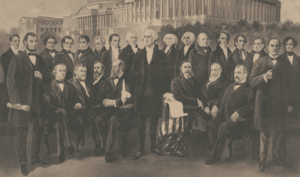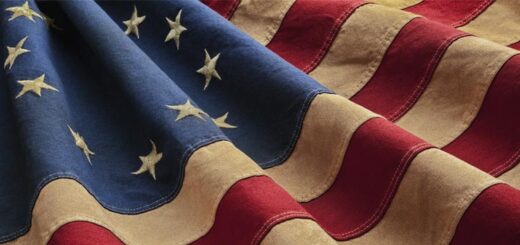Uncover Your Ancestral Connections to Presidents: A Four-Step Guide

If the thought of presidential blood running through your veins brings out excitement, sit down: 100 million Americans have family ties to at least one of America’s 43 presidents. According to Gary Boyd Roberts’ Ancestors of American Presidents book, New Englanders likely share multiple connections while those with Quaker or Southern roots also stand a good chance.
Have you heard tales about one of your great-great-uncles being Ulysses S. Grant’s cousins, or perhaps have Washingtons or Lincolns in your tree that make you wonder? Regardless, are there any familial links with America’s highest office?
Before jumping headlong into researching your family tree, start with recent ancestors and work backward. Even if you think Thomas Jefferson may be your relative, Rhonda McClure advises novice genealogists that conducting their own thorough genealogy research first can help uncover familiar names and localities within each president’s ancestry tree.
McClure suggests that if there’s a president in your family tree, chances are he was related through someone from before 1760; to speed your search up, focus on ancestral lines which go back furthest back.
Norris Taylor of Los Angeles is an accomplished family historian, having traced himself back 13 presidents. To conduct successful ancestral line research on immigrants’ grandchildren and spouses as many published ancestral lines omit immigrant ancestry completely; many published ancestral lines “stop short” of such immigrant relatives by three generations or so, according to Taylor’s findings. Check out Taylor’s Presidential Gallery for results of his Presidential roots research.
Begin your search with an expectation of disappointment — not everyone has presidential ancestry in their family trees, as Roberts states. However, those descended from German or Scotch-Irish immigrants have only a “slim chance” of having one among their ancestors.
And don’t put too much stock in family lore regarding White House links; most likely these stem from 19th-century assumptions that anyone sharing a presidential surname must be related, according to Roberts. “Most of these are false.”
2. Search Published Genealogies
Have you heard the expression, “If you want your genealogy traced for free, run for public office.” All presidents’ family histories have been researched extensively by different researchers; much of this work can be made accessible to you. A good place to begin this search is Roberts’ Ancestors of American Presidents 2nd Edition where any president can be easily located along with their list of surnames in their pedigrees.
Geneagraphie.com’s Presidents Database provides an online alternative to Roberts’ book. Search the presidential index (ordered alphabetically by president) or scan the master index of surnames linked to presidential family trees – such as my own family surname “Britton.” Clicking her name led me to her birth date, spouse (Warren G. Harding) and child’s name – though unfortunately not my ancestor! At least I can rule that out now!
McClure suggests exploring presidential ancestry through other online databases, such as FamilySearch’s Genealogies or WorldConnect.
3. Explore Other Presidential Relatives: First Ladies and Mayflower Ancestors
If it turns out you don’t share any genetic relationship with a president, don’t despair – consider first ladies! Research their maiden names and dates of birth/death by conducting an internet search or consulting the National First Ladies Library which offers an annotated bibliography of books, manuscripts, journals diaries etc relating to presidents wives.
Are Your Ancestors Travelers on the Mayflower? If that is the case, they would have shared a voyage with several American presidents such as John Adams, Ulysses S. Grant and Franklin D. Roosevelt; their names can be found by searching at The Mayflower Society.
Have you ever considered or even heard of the 14 “forgotten” presidents who served under the Articles of Confederation prior to ratifying the Constitution in 1789? These included John Hancock, John Jay, Thomas Mifflin and Nathaniel Gorham – you can find a complete listing and biographical description in George Grant’s Patriot’s Handbook published by Cumberland House Publishing.
4. Investigate the Lives of Presidents
Even without direct family ties to any of our past Presidents, studying their lives can still be enjoyable and educational. You’ll find excellent summaries in Miller Center at University of Virginia’s “Life Before Presidency” essays.
Discover, for instance, that George Washington belonged to the third generation of Washingtons born in British colonies.
Researchers of presidential pasts can also conduct their research using presidential libraries. From Truman through Trump, all their records and historical materials are housed within these presidential repositories that include museums. Millions of records, photographs and multimedia resources as well as family heirlooms or items collected by first families can be found among these presidential repositories; for more information about specific libraries please refer to National Archive’s Presidential Libraries Page.
Enjoy your search for shared ancestry among America’s leaders. However, if after exhausting all available research channels you still don’t find what you are searching for then perhaps running for public office would provide the means necessary for free genealogical tracing services to trace your genealogy back further.
Presidential and Royal Family Trees Discovering presidential progenitors would certainly excite researchers, but adding royal relatives into your tree may offer even greater excitement! There’s a good chance they may also reside among you – one possible link could even be President Ronald Reagan!
Many US presidents trace their lineage back to royalty; Roosevelt traces back to King Edward I of England while Craig Hart’s book Genealogy of the Wives of American Presidents and Their First Two Generations of Descent (McFarland) links some first ladies back to Charlemagne and William the Conqueror.
Experts claim that royal pedigrees provide more accurate presidential-election forecasting than polls and pundits do, with Burke’s Peerage suggesting the candidate with the most royal blood has won every US presidential election race since 1888.



